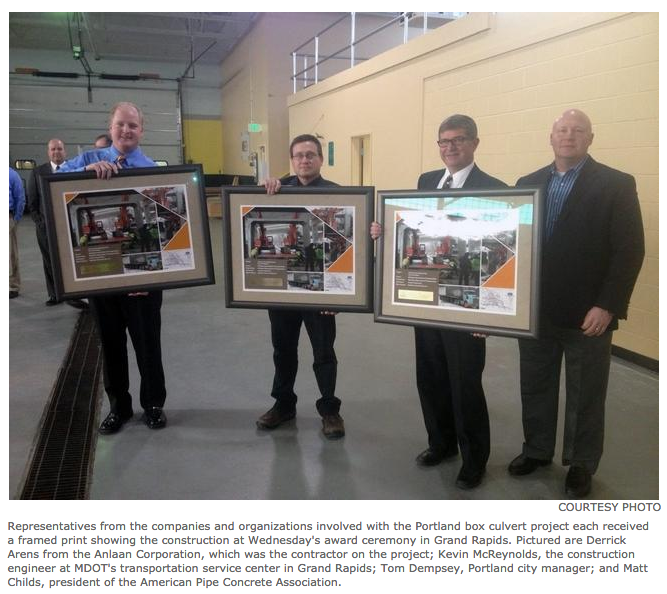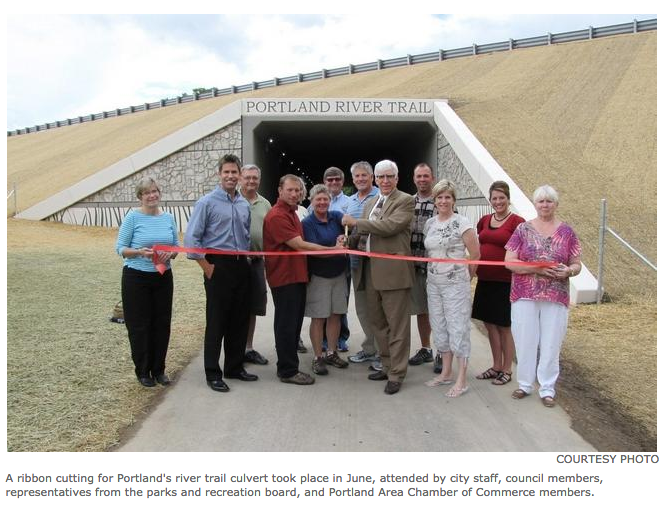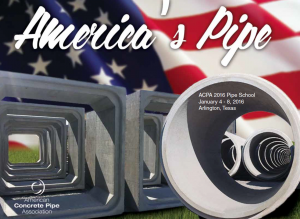(IoniaSentinel.com) – A local award ceremony was held Wednesday in Grand Rapids. Portland City Manager Tom Dempsey attended, representing the city.
PORTLAND, Mich.
The Michigan Department of Transportation (MDOT) project that replaced two I-96 bridges over the Portland River Trail is this year’s winner of the American Concrete Pipe Association’s (ACPA) Annual Project Achievement Award.
A local award ceremony was held Wednesday in Grand Rapids. Portland City Manager Tom Dempsey attended, representing the city.
The award was presented initially in June in Portland, Ore., before an audience of departments of transportation throughout the country at the American Association of State Highway and Transportation Officials (AASHTO) Bridge and Structures Committee meeting.
To reduce maintenance and repair costs, 45 lighted, precast box culverts were used to replace two aging I-96 bridges over the Portland River Trail. The trail is an 8-mile loop that passes through wooded areas and open public spaces along the scenic Looking Glass and Grand rivers.
When MDOT first announced its intention to replace the bridges, the City of Portland’s Parks and Recreation Department, the local Rails to Trails chapter and the general public voiced their concerns regarding the impact any work would have on the trail and its users. But because all parties worked together, and kept lines of communication open, the result has been one the whole community is proud of.
“We worked with them on the design size and aesthetic treatment, and we were very happy with the overall appearance of the end product,” he said. “Comments from people have been all positive, that it adds to the experience of using the trail. It’s now a point of interest on the trail, where walking under the highway wasn’t. It’s something the community can take pride in.”
MDOT weighed several construction alternatives and their impacts, while taking into account the need to maintain mobility for four lanes of interstate traffic carrying more than 30,000 vehicles per day. MDOT’s analysis revealed that repairing the two bridges would actually cost more than removing the structures and replacing them with a large-capacity, precast concrete box culvert.
“It’s much more cost-effective using the culverts as opposed to repairing the two bridges,” said Greg Johnson, MDOT chief operations officer. “It’s not just the one-time savings. These culverts virtually eliminate future maintenance associated with bridges, and that’s great for mobility as well.”
Assembly of the precast sections was accomplished prior to the demolition of the bridges, dramatically reducing the impact on I-96 traffic. Revised scheduling allowed crews to close the Portland River Trail during the winter and early spring, when use of the trail is typically low.
Each of the forty-five sections, weighing approximately 80,000 pounds apiece, totaled 272 feet. From an engineering perspective, the project had a lot of challenges, Dempsey said. Water, sewer, electric, cable and gas lines all ran through the area; and the box culvert had to be installed in a way that preserved the trail and did not interrupt traffic on I-96.




